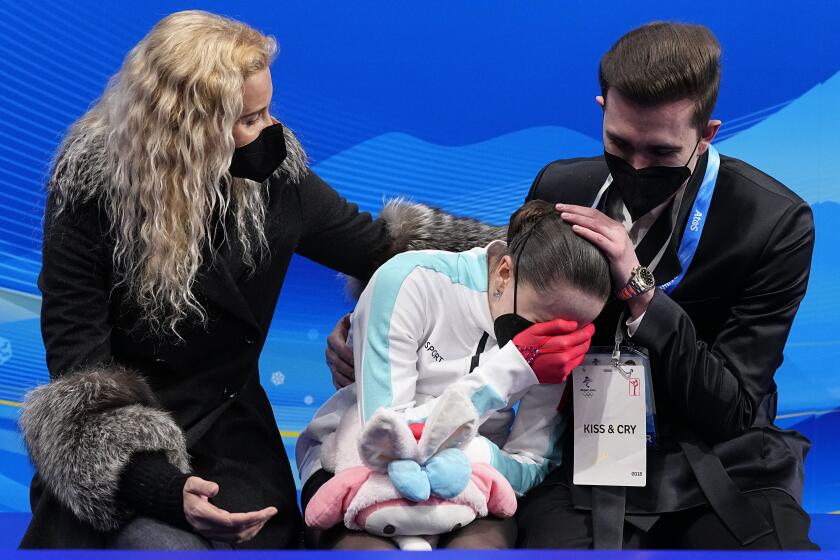Beijing Olympics loop life: Tight security, bus trips galore and aggressive swabbing
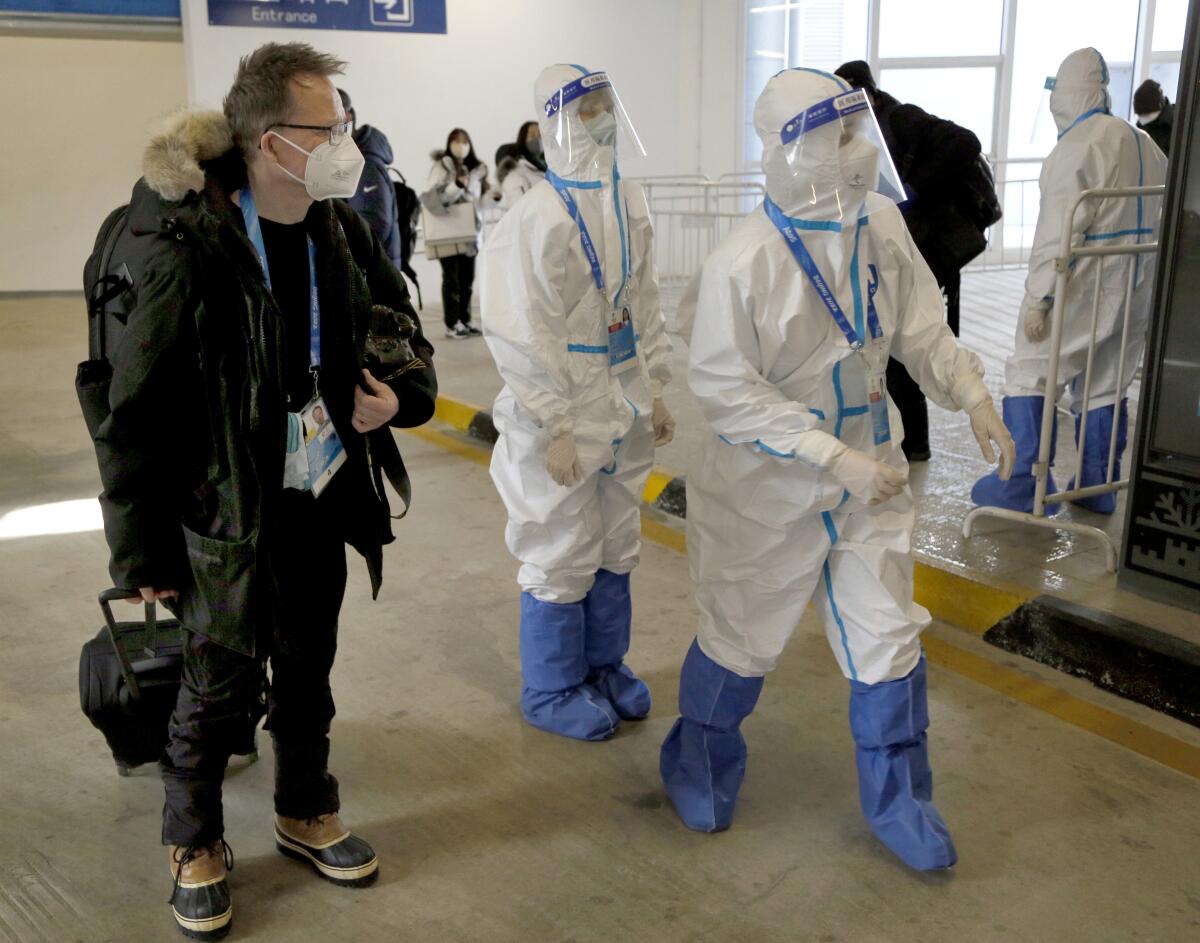
- Share via
BEIJING — Not all the questions from back home have been about gold-medal performances. Not everyone wants to know why a certain skier fell in the slalom or those curlers went for broke with the hammer throw.
When family and friends — and readers — have queried a handful of Times staff at these Winter Olympics, they have often asked about life in the bubble.
These are the second Games under the pall of the pandemic, but Tokyo was far looser last summer. The Chinese have instituted a “closed-loop system” every bit as thorough and restrictive as it sounds.
The protocol affects nearly every aspect of our days in China, so we each picked an example that has affected us most.
Nathan Fenno on daily coronavirus tests
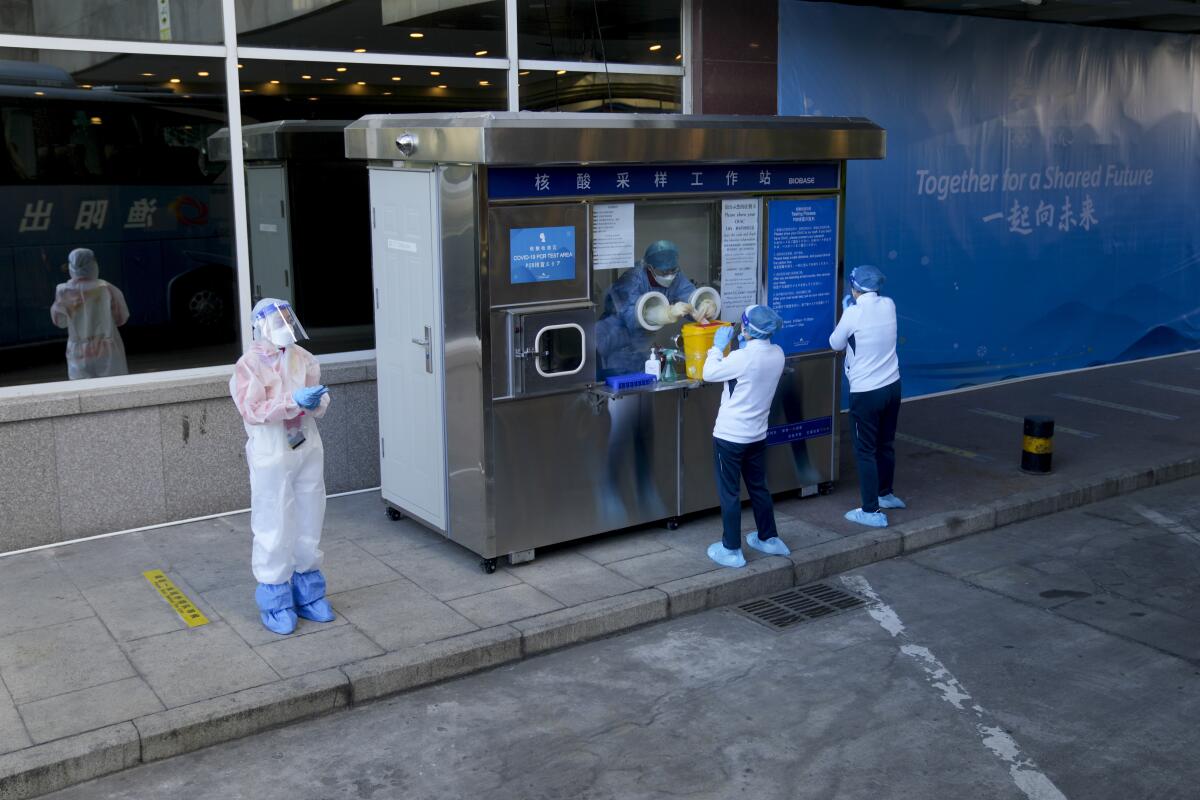
The first time I almost vomited on a woman in a hazmat suit came a half-hour after landing at Beijing Capital International Airport.
The thin probe she swirled around the inner recesses of my nasal passages was expected — part of the laundry list of requirements for those entering the bubble — but then the woman unsheathed a jumbo cotton swab and told me to relax.
She jammed the swab against the back of my throat as the remnants of a hamburger I had consumed on the flight from Tokyo shot up my throat. I choked and sputtered. She removed the swab and looked at me quizzically through a plastic face shield. As I swallowed hard, I told her about an overly sensitive gag reflex I’ve had since childhood. She shoved the swab back down my throat.
Los Angeles Times staff writer Nathan Fenno undergoes a daily coronavirus test during the Beijing Winter Olympic Games.
Last summer, journalists at the Tokyo Olympics had to spit into a small vial every three days to test for the coronavirus. But with the rise of the Omicron variant and China’s zero-tolerance approach, Beijing organizers adopted a more-invasive approach. Every person inside the bubble has been swabbed daily, with something like 1.7 million tests administered since Jan. 23. Your tonsils are not your own.
Those staffers in hazmat suits are on duty at every bubble hotel. They scan your credential, scan the bar code on a red-capped vial, tell you to relax and get to work. You spit out a “Thank you,” though the feeling is less thankfulness and more questioning the life choices that led to this nauseating predicament.
Skipping isn’t an option. If you haven’t been tested, you cannot leave your hotel.
As the days passed, the first colleague through the line each morning would text a scouting report to the rest of us about the aggressiveness of the swabber. We quickly learned to complete the chore before breakfast or even the strongest stomachs would be tested.
Our voices grew hoarser. We kept swallowing against the catch in our throats, but it lingered like an unwelcome guest.
David Wharton on restricted movement
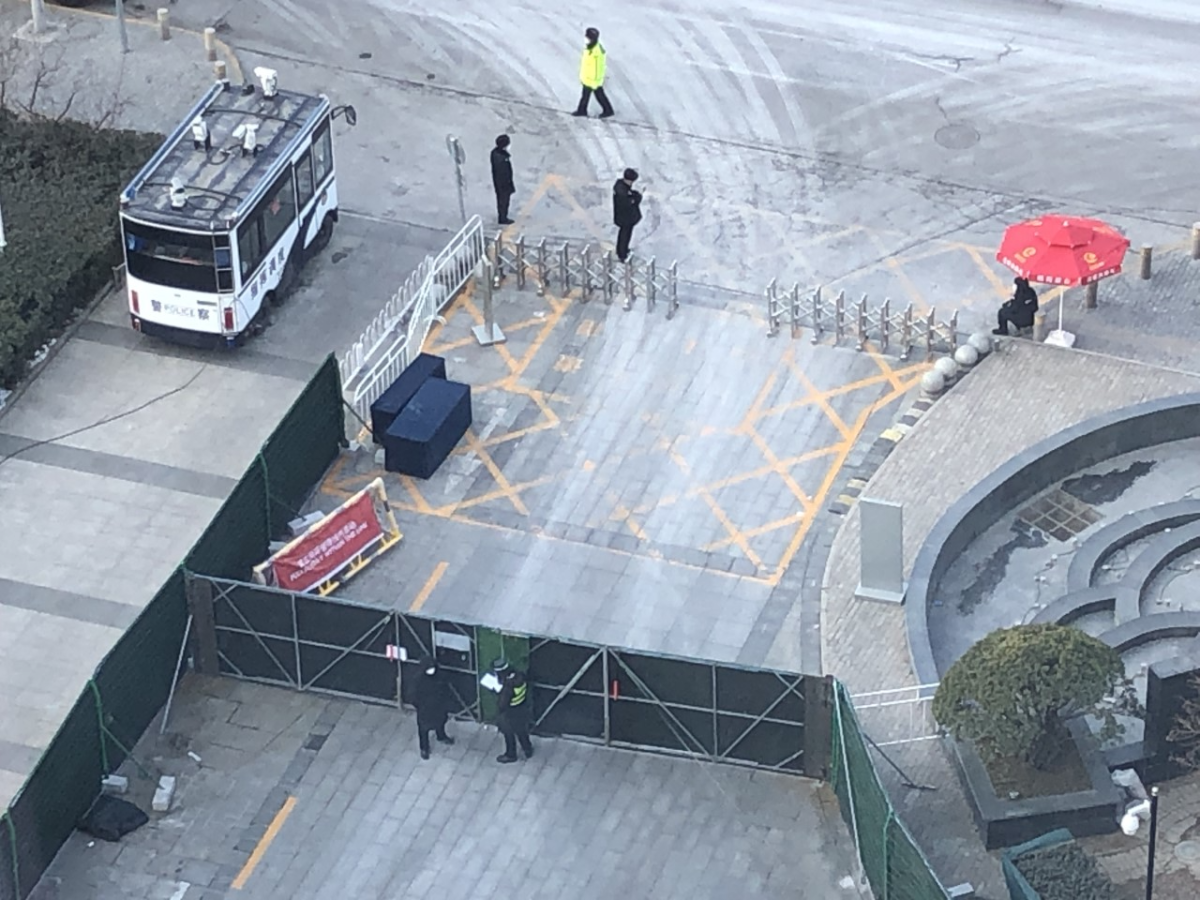
At any given moment, day or night, I can peer out the window at a handful of police guarding the temporary fence that surrounds my Beijing hotel. Not one but two gates must be drawn back for vehicles to enter. Security personnel in a small trailer, equipped with large television monitors, surveil the grounds around the clock.
Coronavirus countermeasures are serious business at these Winter Olympics. The city has taken pains to insulate itself from thousands of us — athletes, coaches, officials, media — visiting for three weeks of competition.
Our hermetically sealed lives are restricted to: Hotel, media center, venues. Physical activity is limited to walking the same hallways, sitting in the same stands, returning to the same room each night, with only a few steps required to go from any of these sites to waiting transport buses, which are also sealed in the bubble.
Looking at color photos of tourist attractions such as the Summer Palace and Temple of Heaven on the walls of the media center, a colleague remarked: “Great, all the stuff we can’t actually go see.”
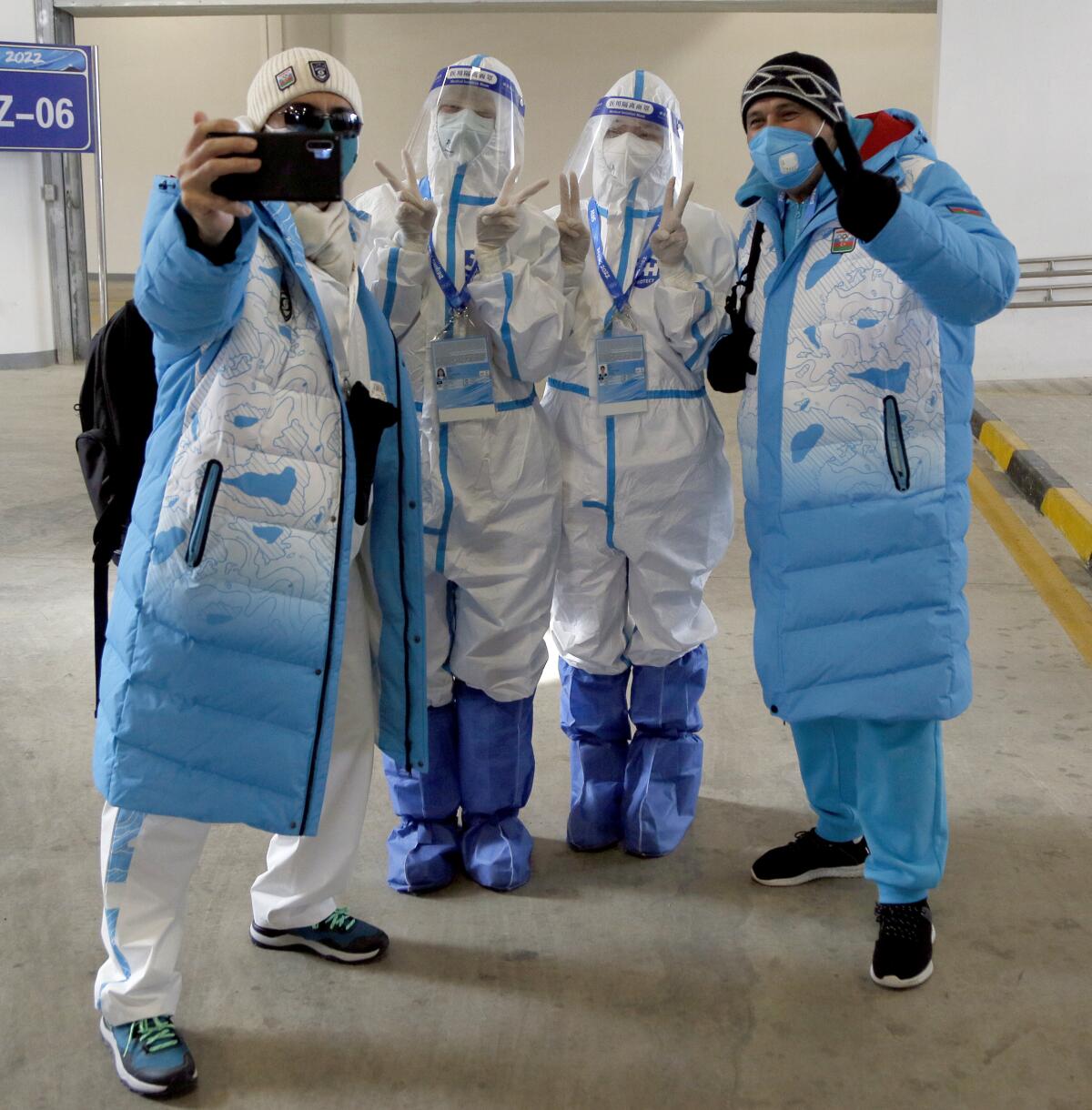
Researchers have found that captivity alters the natural instincts of wild animals and lately I’ve come to suspect the same might be true for Olympic journalists.
Frustration and grinding of teeth are common to both groups. So are repetitive, often destructive behaviors which, in our case, manifest in constantly perusing the office snack table, grabbing another piece of candy, a few crackers, anything to get through deadline.
One difference: Zoo animals channel anxiety through excessive over-grooming, but we have slipped the opposite direction, bathing irregularly, wearing the same jeans for days on end.
I worry about other potential symptoms — degeneration of brain capillaries, dendritic branches and synaptic connections — that contribute to decreased memory and poor decision-making. That certainly describes my writing after nearly a month at the Beijing Games.
Thuc Nhi Nguyen on Olympic transport
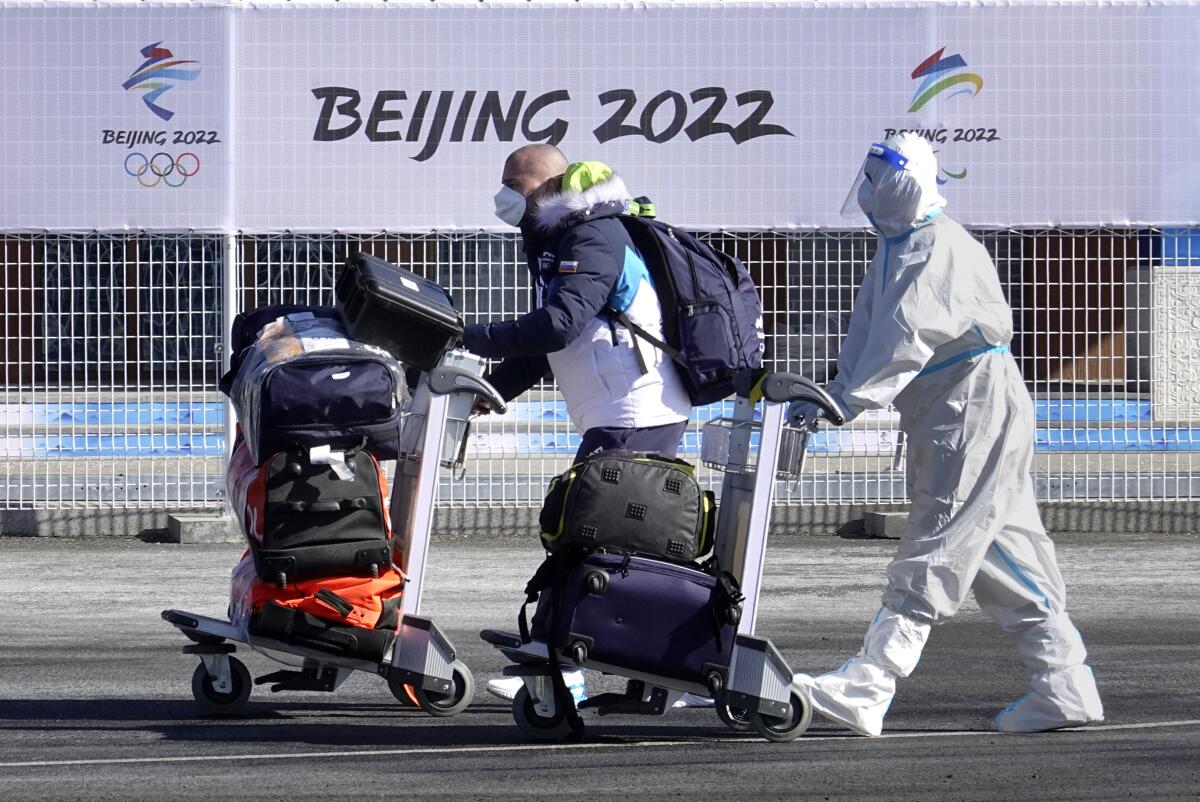
Only in the Beijing bubble is the shortest distance between two points a bus loop around the block.
The limitations of the closed-loop system have elevated an already complicated Olympic rite — riding the bus — to near-impossible levels. Even crossing the street on foot has been out of the question.
These sprawling Winter Games encompass venues in three zones: Beijing, Yanqing to the northwest and Zhangjiakou even farther away.
A 144-page transport guide lists roughly 50 bus routes, though daily schedules tend to change based on the competition and, well, the day. Getting around has required looking up departure times for every bus, every morning.
On average, I have taken four bus trips a day, sometimes as many as eight. There have also been rides on a high-speed railway between zones.
Solving the puzzle has felt like it deserves a gold medal.
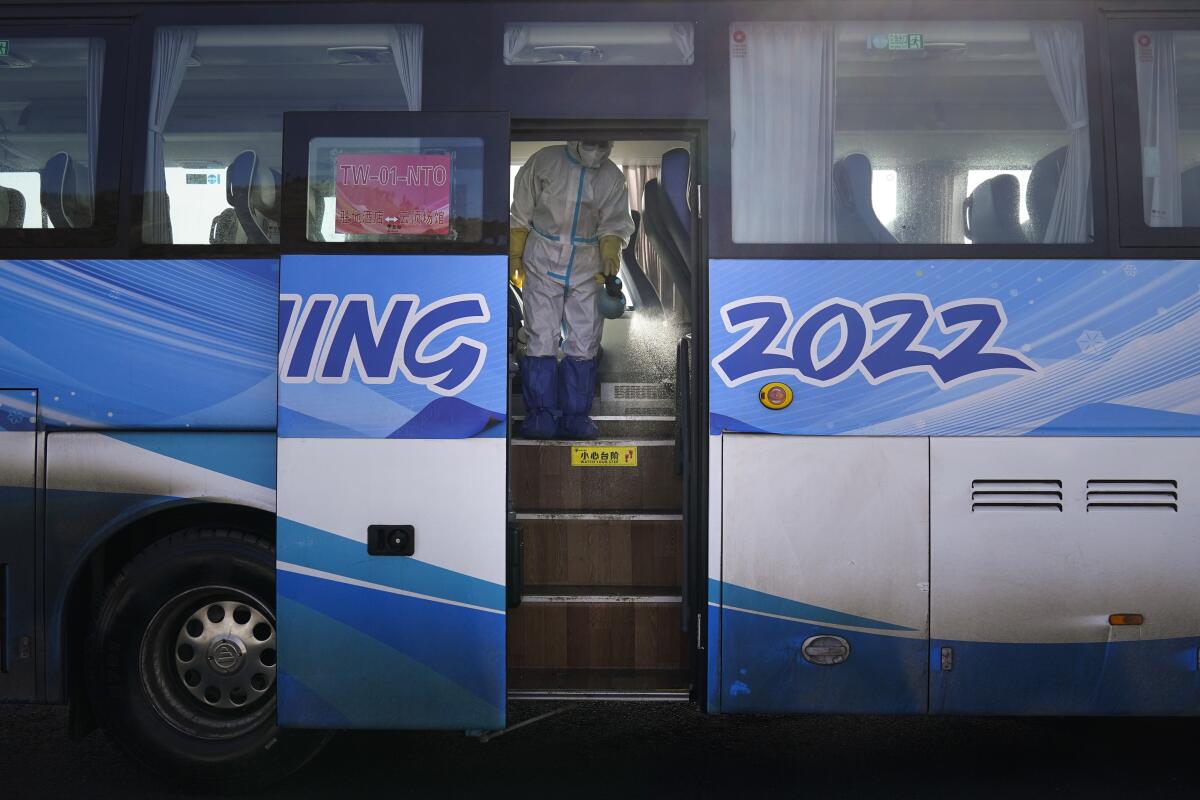
But it hasn’t been all bad. I located heaters on the bus and sat near them after enduring sub-zero temperatures. I memorized bus numbers and used the commute time as a peaceful escape. After covering the men’s snowboard slopestyle final, I climbed onto a bus and found gold medalist Max Parrot on board.
On trains from Beijing to Zhangjiakou, I spent the 50-minute ride gazing out the window at China’s frost-kissed countryside and watching wind turbines spin. The sky changed into pastel shades of purple, pink and orange during the early evening rides.
As our bright-green Olympic buses rumbled through cities, people on the sidewalk sometimes waved. Though I looked at their maskless faces with envy, just seeing anyone smile made me smile, too.
Stephanie Yang on food
It started with a rumor, a text, a hot tip.
The word on the closed-loop streets was that somewhere inside this maze of barricades and bus routes, there was bubble tea or lamb skewers or an entire roast duck to be carved tableside.
In normal times, there would be no shortage of amazing dishes and local cuisine around Beijing, but COVID-19 protocols have kept most of that out of reach, relegating journalists to cafeteria food. Some of the most dogged reporting at these Games has not been about athletes or competitions, but where to find a good meal.
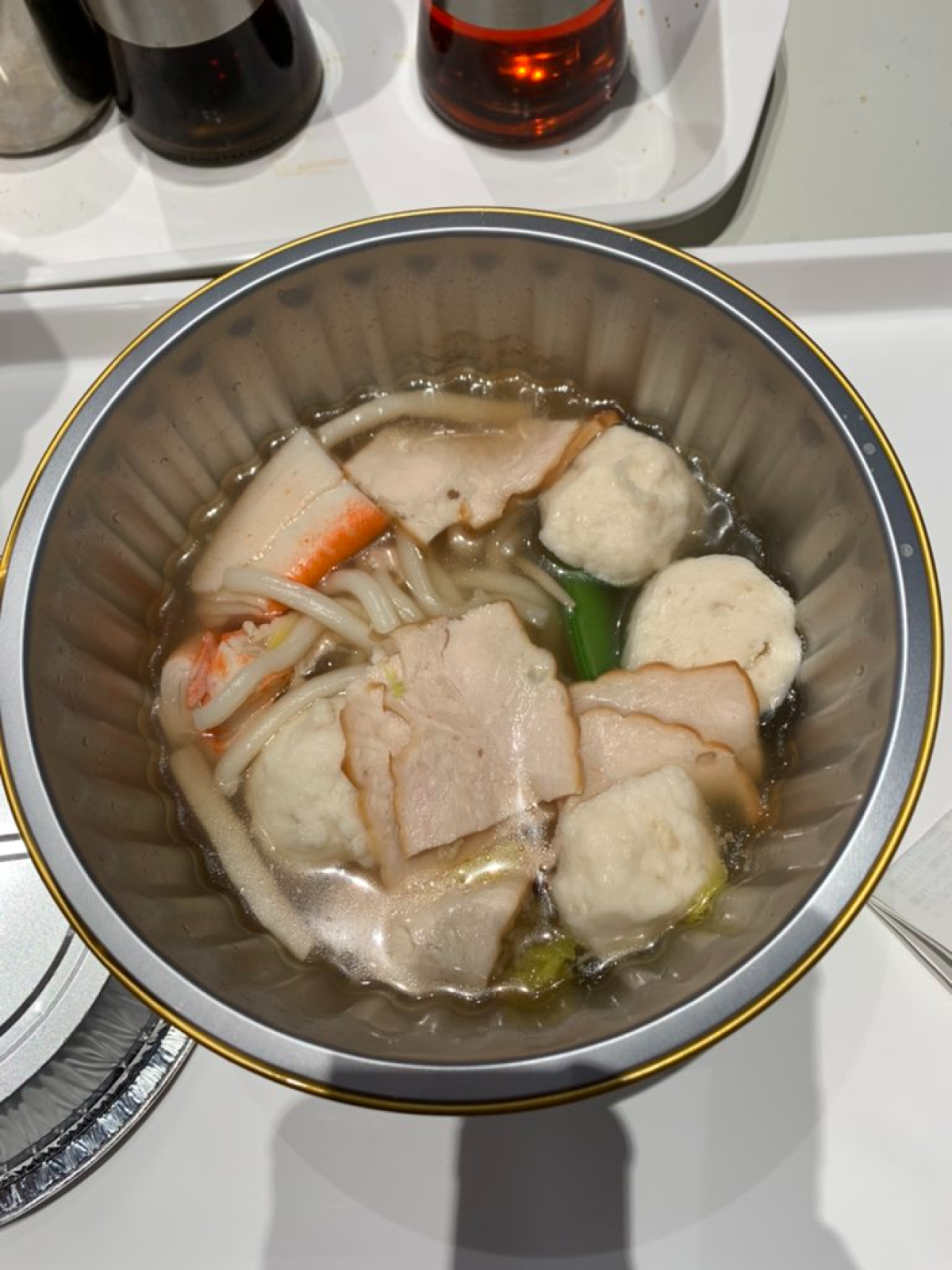
There is no Zagat guide for bubble dining, no Yelp for the pandemic offerings at each hotel. What has materialized instead is an informal whisper network.
I’ve quizzed friends and old colleagues about the best places and dishes available at their hotels, passing that information on. Others have taken it a step further, calling hotels to get restaurant menus, which can change day to day.
Chasing a tip, I asked volunteers at the media center help desk if I’d be allowed to walk to the hotel next door. “I heard they have hot pot there,” I explained.
“Hot pot?” the volunteer looked intrigued, before explaining that I would still need to take a bus, another common complication in trying out different restaurants.
She then asked how the media cafeteria was, since she ate every day in the worker’s canteen down the hall. I told her somewhat apologetically that it was fine, just not super authentic.
Eileen Gu has become as good at avoiding answers to difficult questions as she is in freestyle skiing. She has one gold and one silver at the Beijing Olympics and one event to go.
In Zhangjiakou, a friend recommended I visit a convenience store tucked away in the courtyard of his hotel. The payoff was immediately apparent as I filled my arms with cookies, candies and other snacks that I hadn’t found elsewhere. Upon eating my best bubble meal of twice-cooked pork, shredded spicy potatoes and scallion pancakes, I immediately notified friends with photos.
“Thank you so much,” one said the next day in her review, “you saved my life.”
John Cherwa on internet restrictions
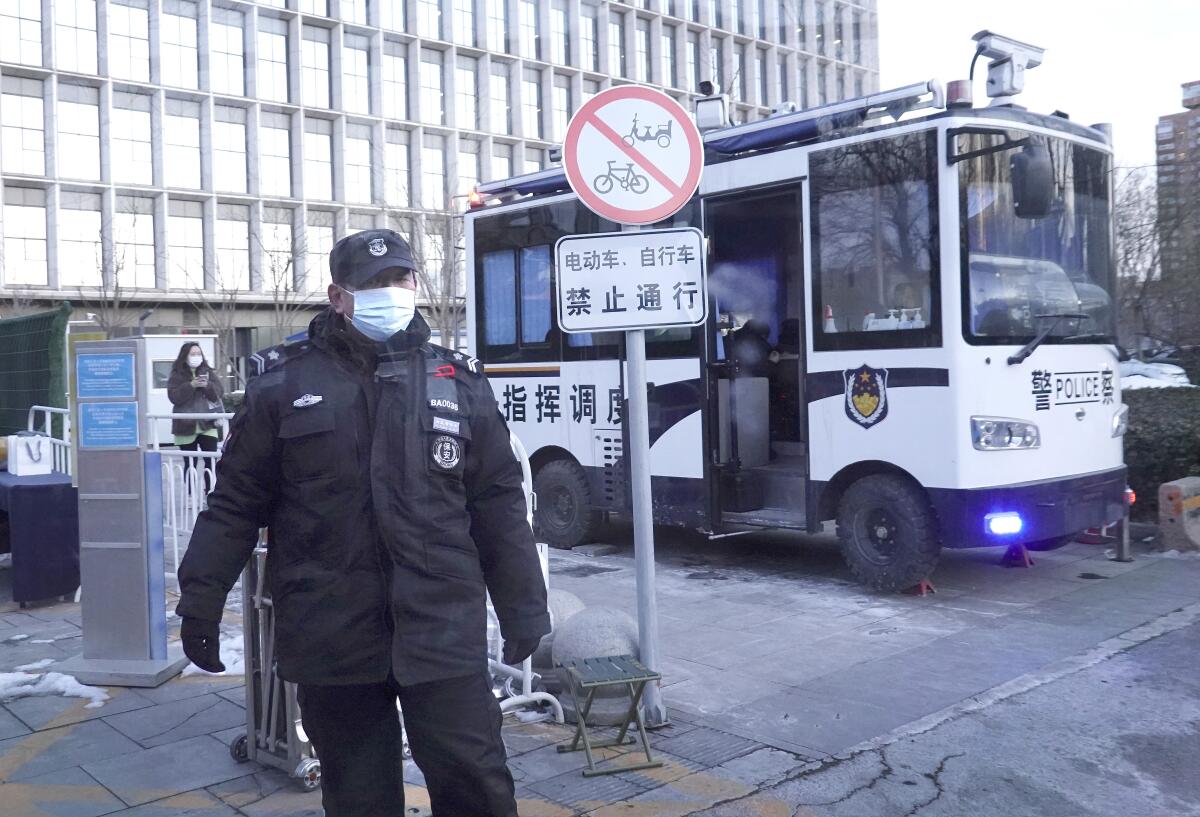
Arriving at the Olympic Games, few of us realized how reliant we had become on internet access.
Though an exception was made at the media center, Google, Yahoo and information-finding systems were otherwise blocked. You were out of luck at your hotel and venues. You felt cut off from the world.
The door slamming shut on our internet worked both ways. Times journalists struggled to use aspects of our company’s computer system, which refused pretty much anything with a China IP address.
If we were foolish enough to try financial transactions, such as paying bills or accessing a credit card account, we were similarly turned away. Gone from home for three weeks, we had to have someone else take care of business or be late on bills.
IOC President Thomas Bach is outraged by the way adults treated Russian figure skater Kamila Valieva. The age limit in the sport should be raised.
With The Times installing a VPN line from our office back to Los Angeles, I thought, ‘Hey, maybe I can sign on to Hulu or Netflix.’ Nope, somehow it figured out I was in China and I was greeted with a scolding message about trying to get service from an unauthorized area.
But there was one line of communication with the U.S. that not even China could stop. One aspect of our normal lives that we did not leave behind upon stepping inside the closed-loop system.
At 5:09 a.m. the other day, my cellphone woke me up with a call from the city of Canal Fulton, Ohio. A recorded voice reminded me that my car warranty was expiring. And this was my last warning.
More to Read
Go beyond the scoreboard
Get the latest on L.A.'s teams in the daily Sports Report newsletter.
You may occasionally receive promotional content from the Los Angeles Times.

